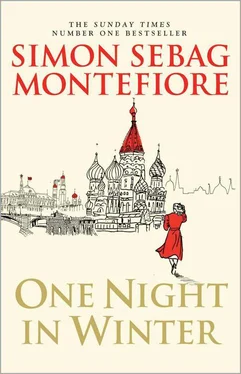‘Understood, understood,’ she said. ‘But will the weather change soon?’
‘It is changing,’ he said. What did he mean? That the investigation was coming to an end, that Senka and Minka were coming home? ‘Dashka,’ he said, leaning into her. ‘I’ve heard that there is rain coming…’
‘Rain?’ she asked desperately. ‘But the children won’t feel the rain because they’re inside?’
‘Precisely,’ said Satinov. ‘A few drops may fall on them but we are the ones who will get wet.’
‘We will?’
‘The future of Communism’, he said carefully, ‘depends solely on Soviet youth.’
Dashka blinked hard, concentrating on what this meant. Surely he was saying that they were no longer so interested in the children. Her insides relaxed and then tightened like a noose. Or did he mean they were deploying their children against them , their parents? Another cramp in her womb made her wince and she pressed her hands on her belly. The deep ache inside her meant she was bleeding. She was not surprised: everyone had an Achilles heel and this was where despair and panic always hit her. But she was wearing a cream-coloured suit, and she was quite unprepared for this. She was late for a meeting at the ministry and now she was bleeding. She had to rush home to change. But then something made her stop: she realized that she had not even asked about Satinov’s family. How was Tamara and where was Mariko? Only Marlen was with him. ‘I’ve got to run,’ she said. ‘Is Mariko here? I didn’t see her.’
Satinov’s expression softened for a telling instant. ‘She can’t come to school at the moment,’ he said haltingly.
Mariko too? She was only six, four years younger than Senka! What must he and Tamara be going through?
‘You too?’ she whispered. Sympathy for him and, yes, Tamara welled up in her. She fought the urge to touch him. Her affection for him rushed through her. If she lingered, it would devour her. But simultaneously disgust, regret, guilt galloped over those feelings and purged her. She shivered at what she had once done.
She suddenly understood that their children were being used against them. What if Senka said something foolish? What about Minka? Would any of them survive this?
‘THERE’S NO NEED to get rough,’ said Benya Golden to Colonel Likhachev. ‘Just ask and I’ll tell you. I’ve nothing to hide and you know my secrets better than I.’ Benya was a connoisseur of Chekist investigations and he knew how they metamorphosed from one stage to another just as he knew that while many leaders had the power to initiate and intensify cases, only Stalin could redirect, redesign and resculpt one.
‘Let’s talk about your life, Prisoner Golden.’
Benya observed his interrogator under the light of the naked bulb that swung low over the table like a censer in an Orthodox church, and noticed how the swollen red pores of his face were evenly spaced, as if by design.
‘I honestly can’t understand how you ever got a job at that school. In fact I can’t understand how you’re even amongst the living. Let’s see…’ He consulted his file. ‘Born Lvov. In 1939, you were found guilty of terroristic conspiracy. Death sentence commuted to twenty-five years in the camps but in June 1941, you were allowed to join one of the shtraf battalions…’ Likhachev looked at him searchingly with something approaching respect. ‘You don’t look like a tough guy.’
‘I’m not,’ Benya admitted.
Likhachev lit a cigarette. ‘How on earth did you get to join them?’
Benya shrugged: ‘I just don’t know.’ In the catastrophic retreats of June 1941, when Hitler’s panzers were racing towards Moscow and millions of soldiers were being encircled and captured, some desperado criminals in the Gulag camps were allowed, as a special favour, to join the penal battalions – the shtraf.
Benya Golden was a political prisoner and ‘politicals’ were not allowed to join even the shtrafniki. But there were a few exceptions: Benya applied because he wanted to defend Russia against the Nazis and because he knew he would perish in the camps anyway. His request was permitted.
‘So,’ Likhachev said, ‘you owe your life to a bureaucratic mistake. We’ll look into that.’
The shtrafniki were given impossible tasks – do-or-die missions: clearing minefields, defending doomed positions. They were fed one-tenth of the usual rations of a Red Army soldier and, guarded by the secret police, could be shot without explanation or trial for the slightest infraction. If they served well, they could, in the rarest cases of heroic bravery, earn their freedom. But that was almost unheard of. The shtrafniki did not live that long.
‘How did a puny Yid like you survive?’ Likhachev asked.
To his own surprise, Benya had been a savage warrior. His officers recommended him for the star of Hero of the Soviet Union but as an ex-political, he could not receive it. Wounded and discharged in 1943, he applied for a teaching job at School 801 and, surprisingly, got the position.
But whatever horrors he had been through, he knew he was still himself, or at least a damaged, cynical, heartbroken version of what he had once been. And a half-man, Benya Golden thought now, is harder to hurt than a whole one. Only his body could be destroyed. That was why he sat calmly in one of the rooms he remembered from six years earlier, and waited for the session to begin.
‘From the moment you arrived at School 801, you set out to undermine Marxist-Leninist ideology,’ Likhachev was saying.
‘No,’ Benya replied. ‘I wanted to teach literature as I thought it should be taught.’
‘What other way is there but the Party’s way?’
‘I’m not political.’
‘You poisoned the minds of the children with romantic philistinism, manifested by the Fatal Romantics’ Club.’
‘Not at all. I love Pushkin. I had one chance to create a love of literature in young people. In the thirties, I loved a woman. Pushkin was our poet. Our poem, the poem of our true love, was “The Talisman”, so when I was close to Pushkin, I was close to her .’
‘You disgust me, Yid,’ snarled Likhachev. ‘You wormed your way into that school to corrupt the leaders’ children and launch a conspiracy to assassinate Comrade Stalin.’
This answered one of Benya’s big questions. When they started to arrest more children, he’d realized that this was no longer just about the deaths of two teenagers. Somehow this had become ‘a conspiracy’.
‘I was never part of any plot,’ he replied, ‘unless it was a conspiracy to love Eugene Onegin .’
‘Was the conspiracy led by “NV”?’
‘There was no conspiracy. As for “NV”, did that stand for Blagov’s name? Nikolai Vadimovich?’
‘Do you take us for fools? It’s not Blagov.’
‘Then I don’t know an NV.’
‘What does NV mean in Onegin ?’
‘Ah. In Onegin, it would be Nina Voronskaya,’ Benya said thoughtfully. ‘She’s the only NV in the poem. I’ll recite it for you. Onegin sees Tatiana next to this lovely society hostess:
‘She took a seat beside the chair
Of brilliant Nina Voronskaya,
That Cleopatra of the North.’
Benya shut his eyes, taking consolation from the lines.
‘Is there a page number for this reference?’ Likhachev asked.
‘Page? Chapter eight, stanza sixteen, I think.’
Likhachev wrote this down in his childish handwriting. ‘And this NV has to stand for a girl, right?’
Benya Golden was tempted to laugh, so simplistic was the implication of Likhachev’s question. A conspiracy; an unknown person named after an Onegin character? Could the person they were looking for be a girl after all?
Читать дальше












